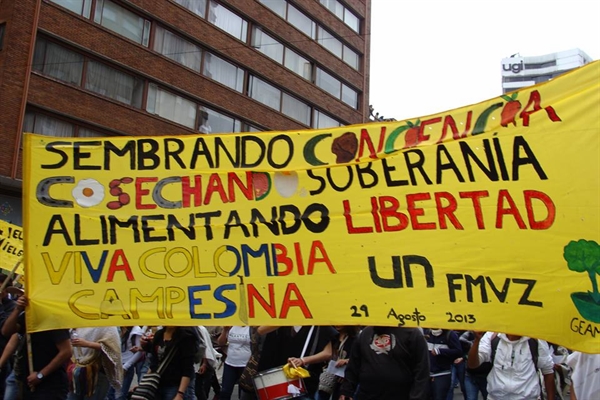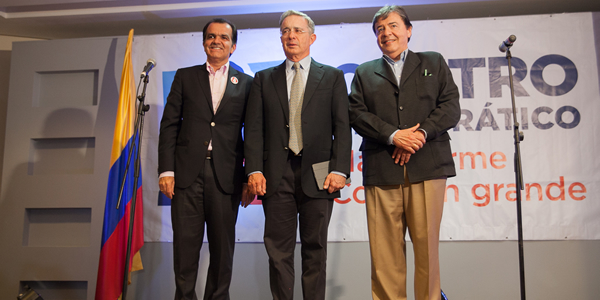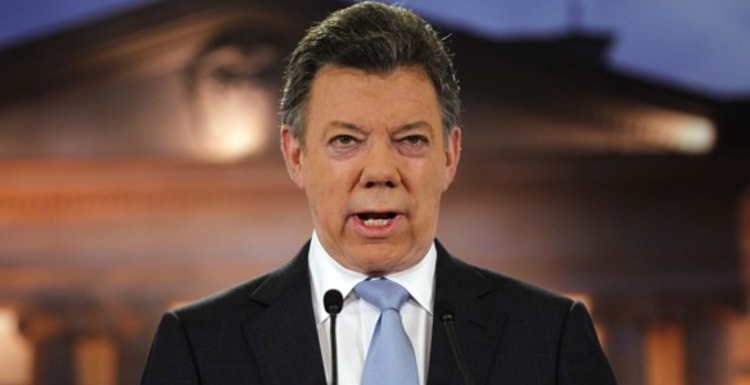Santos Under Pressure Amidst Agrarian Activism and an Emerging Opposition
Colombian agrarian, indigenous, and Afro-descendant groups convened at a National Agrarian Summit on Saturday, March 15 to vent their anger with the administration of President Juan Manuel Santos (2010-2014). Moving into protest marches the following Monday, attendees united to express frustration over the government’s inaction regarding promises that were agreed upon last September. The accord had ended a nearly three week national agrarian strike, but since then Santos has been backpedaling.
Politics complicate the situation. The successes of former president Alvaro Uribe’s ultra-right Democratic Center (CD) party during the March 9 congressional elections now poses additional obstacles for the nation’s government, particularly regarding its attempts to fulfill its obligations to the agrarian sector, for the CD stands in determined opposition to reform. The CD is also challenging the current status of the peace negotiations now being held in Havana, Cuba, particularly the transitional justice plan for the integration of FARC members into the country’s civil and political life.
Meanwhile, Colombia will hold presidential elections in May, with former Bogotá mayor and member of the center-left Green Alliance party, Enrique Peñalosa, and President Santos as the front-runners. Whoever is elected will face the twin challenges of seeking to finish the peace negotiation successfully, while also delivering on the promises made to poor farmers.
Agrarian Frustration Over Government’s Inaction
More than 4,000 leaders from an array of social organizations came together on Saturday, March 17, at the Agrarian Summit (“Cumbre Agraria Campesina, Étnica y Popular”) to address the pressing issues of land distribution and recognition, land displacement, food sovereignty, mining, and free trade agreements. The meeting was an attempt to unify indigenous, Afro-descendant, farmer, and worker communities to push for a structural change in Colombia’s agrarian policy.[1] Eleven organizations, including the National Agrarian Coalition (CNA), the Black Community Movement (PCN), the Congress of the People, the Patriot March, the Roundtable of Dialogue and Agreement (MIA), and the National Indigenous Organization of Colombia attended the Summit. [2] These organizations are reviving the mobilizations of 2013, which included a national agrarian strike that took place to demand popular participation in the peace negotiations, investment in social programs in rural areas, control over seeds, the fulfillment of a series of promises, and protection from free trade agreements. The FTA with the U.S., signed in May of 2012, is of particular concern for farmers.

On September 9, 2013, the 19 day-long strike concluded with the government and the farmers agreeing to the National Agrarian Pact. According to the Colombian Department of Labor, the Agrarian Pact “is the mechanism by which, in an inclusive way and under the premise of the active participation of social organizations, the aim is to reformulate the public policy of the agricultural sector and rural development.”[3] The National Agrarian Pact calls for the establishment of protections for farmers who face competition from cheaper agricultural products flowing into Colombia from countries with which Free Trade Agreements have been signed. The Pact promises to provide credit to the agricultural sector.[4] In the agreement Santos agreed to promote rural development that benefits small farmers and promotes “integral rural reform.”[5]
Exasperated by government foot dragging since the dialogue, farmers, indigenous peoples, and Afro-descendant communities returned to protest yet again. [6] Some farmers are dissatisfied with the deal struck, pointing out that the Agrarian Pact could aggravate land displacement in Colombia, since it would require small producers to sign agreements with entrepreneurs in the agricultural sector. [7] César Geréz, member of the National Association of Rural Reserves, declared that the mobilizations are “a response to the national government’s Agrarian Pact that has sought to deceive the rural sectors of Colombia, and it is an organized response to the failure of the government in different areas of discourse throughout the country.”[8]
Óscar Salazar, the spokesperson of the Mesa de Interlocución y Acuerdos (MIA) said the farmer communities decided to carry out another national strike to unify the different communities and demand the fulfillment of the promises that ended the 2013 strike. [9] Thousands of people peacefully protested on Monday, March 17, in Bogotá to demand a comprehensive agrarian reform and increased government attention to the rural sector. President Santos claims he has fulfilled 70 demands out of 183, but the people feel the government has failed them. [10] According to César Pachón, a leader and organizer of the protests, the government has in fact done the opposite of what it had promised to do when the protests ended last year. [11]
If the government does not address the grievances of the campesinos, another National Strike is almost certain to take place at the end of April/beginning of May. The timing for these protests is important, as they will occur just prior to the country’s May 25 presidential elections.[12] The organizations and their leaders who convened at the National Agrarian Summit and participated in the protests on March 17 released a declaration which outlined specific demands and grievances that need to be addressed by early May.
Democratic Center Threatens Santos’ Agenda
The Santos administration faces a threat from the newly formed Democratic Center (CD), which is now the second strongest force in the senate. The CD, led by former President Uribe, will challenge the majority of Santos’ National Unity Coalition, which consists of Santos’ U party, and the Conservative, Liberal, and Radical Change, parties. The immediate impact of the CD’s congressional success was a major decline in representation for the U Party: a loss of 10 seats in the 166-member House of Representatives and 9 seats in the 102-member Senate. [13] The CD now holds 19 seats in the Senate and 12 in the House. Uribe’s party even grabbed a victory in Santos’ home district of Bogotá.
The Conservative Party (PC), a major force within the National Unity Coalition, had previously backed Uribe. Now the PC is beginning to break with the Santos’s coalition, instead endorsing its own candidate, Marta Lucía Ramírez, in the upcoming presidential elections.
These evolving political alliances and electoral inroads by Uribistas present challenges for the ruling government’s approach towards the ongoing peace process currently taking place between the revolutionary armed forces of Colombia (FARC) and the Colombian government. Thus far in the talks the FARC have promised to end its use of violence if granted full political participation by the Colombian government. The FARC shares the demands of the agrarian movement, calling for economic development of rural lands and for land redistribution. The FARC has also proposed reform of the drug regulations in hopes of continuing their cultivation of coca and other presently illicit crops.
The FARC recently expressed their own concerns with the head of state. After Santos defied a recommendation of the International Commission of Human Rights by ousting Bogotá mayor, Gustavo Petro, and replacing him with Rafael Pardo, the FARC stated at the 22nd round of negotiations in Havana that, “This fact creates a negative impact and affects the confidence at the negotiation table.” [14] Petro had been a strong advocate for finding a pathway to peace in Colombia, a determined voice for reconciliation.
While Santos’ U Party has worked with the FARC on a number of their demands, members of the CD have a tendency to be much less compromising. The former Senator and current presidential candidate for the CD, Óscar Iván Zuluaga, wrote a letter to President Santos on March 19, asking the president to suspend talks with the FARC. This came shortly after news broke that some members of the insurgent group had killed two policemen in the southern Colombian town of Tumaco. [15] Following the murders, the Santos administration released a statement on March 23, condemning the actions of the particular FARC members involved. [16] The FARC has accepted responsibility for these actions and has agreed to a full investigation. [17] Zuluaga, however, threatened the peace talks once again on March 26 by recommending that the FARC be tried in the International Criminal Court for the murders. [18]
Uribe joins Zuluaga and other CD members in their fierce determination to derail the peace talks. Uribe personally led a “democratic security” campaign against terrorism throughout his presidency and has openly opposed Santos’ policy of transitional justice and political inclusion of the FARC. Uribe still strongly favors the U.S.-backed military solution to dealing with the FARC militarily, and perceives Santos’ approach to conflict resolution as weakness. Uribe rejects all consideration of FARC amnesty and political inclusion.

Uribe’s growing influence in congress is indeed worrisome because of his alleged ties to paramilitaries and his record of human rights violations. Last year, Pablo Hernán Sierra, a former paramilitary leader, admitted Uribe’s leading role in the formation of death squads in Medellín and his active involvement in paramilitarism, stating that Uribe “is the head of paramilitarism in Colombia.”[19]. The paramilitaries are notorious for threatening and murdering farmers. Although Sierra noted that he does not have evidence that Uribe ever shot a gun, he explained that the former president led the paramilitary groups from his “political and ideological platform.” [20] Former National Police Major Juan Carlos Meneses, who fled Colombia 12 years ago for speaking out about the paramilitary links of the former president’s brother, Santiago Uribe, turned himself in this past January and has offered to testify to the involvement of Santiago Uribe in paramilitary activities. [21]
After listening to seven testimonies by former paramilitaries, Judge Rubén Darío Pinilla of the Medellin High Court decided to finally call for an investigation on former president Uribe’s ties to paramilitaries.[22] The close relationship between paramilitaries and government officials, what has been coined as parapolitics, is so widespread and deep that it is often impossible to draw a line between the two. Diego Fernando Murillo, another former paramilitary leader, acknowledged that the United Self-Defense Forces of Colombia (AUC), a major right-wing paramilitary group in the country, donated $1 million to Uribe’s campaign for the 2002 elections. [23] Nonetheless, all the scrutiny of Uribe has not dissuaded him from successfully running for a seat in Congress and to lead the CD. More alarming are the conclusions by the non-governmental organization Peace and Reconciliation Foundation, which argues that one-third of the newly elected senate has links to paramilitaries. [24] This revelation comes after monitoring the candidates of the congressional elections of Sunday March 9, which was marred by a 56.42 percent abstention rate. [25]
In February, the Colombian government and the FARC reported that an unidentified surveillance operation had illegally intercepted confidential information from the peace talks in Havana. During this controversy Uribe was accused of being involved in the spying. Some charges came from the lead negotiator for the FARC, who called Uribe “the No. 1 enemy of peace in Colombia.” [26]
But Uribe claims that the full force of his support has not been seen. The CD has reported that nearly 8,000 voting tables were not included in the tallying of votes during the March 9 congressional elections. According to the CD this omission may have left out some 250,000 votes in favor of the party. Electoral tribunals in Colombia have dismissed these claims. [27]
The reelection of Santos would at least provide him the chance to rectify his commitments to the agrarian sector and to achieve success in the Havana peace talks. However, there are signs that neither Santos’ U party, nor Uribe’s CD will be the winners in the 2014 presidential elections. A poll released by Datexco in March showed, surprisingly, that the leftist Green Alliance candidate, Enrique Peñalosa, is now favored to win come May. According to the poll, Santos is predicted to lead the preliminary round with 25.5 percent of the votes for his campaign, and 17.1 percent in favor of Peñalosa. In the second round, the survey forecasts a Peñalosa win with 40.4 percent supporting his campaign – 3 percent more than those in favor of Santos. [28] Peñalosa has strategically distanced himself from the political bickering often associated with the CD and the U Party, and instead aligned himself with those who favor reform, most recently maintaining, “I am not anti-Uribe. I am not anti-Santos. I am pro-Colombia.” This approach appears to be working. [29]
Looking Forward: Establishing Peace in Colombia
Whether it is Peñalosa or Santos who wins the presidency this May, the next administration needs to take a clear path in regards to agrarian reform and the peace talks. The future administration will have to work with a wide-range of agrarian representatives and leaders to establish a comprehensive and fair agreement. Then, the government must fulfill its obligations explicitly agreed upon within that agrarian accord.
While the establishment of the CD party in congress is disturbing, the next administration can overcome its presence by rallying those in support of the peace process in Colombia. A final agreement established via the Havana peace talks will serve as a vital framework for peace. However, further steps need to be taken in order to guarantee the stability of a peaceful and equal society in Colombia.
By Jason Mann and Jeanette Bonifaz, COHA Research Associates
Please accept this article as a free contribution from COHA, but if re-posting, please afford authorial and institutional attribution. Exclusive rights can be negotiated. For additional news and analysis on Latin America, please go to: LatinNews.com and Rights Action
For additional news and analysis on Latin America, please go to: LatinNews.com and Rights Action
References
[1] “Rueda la Cumbre,” Radio Mundo Real, March 15, 2014. http://www.radiomundoreal.fm/Rueda-la-Cumbre?lang=es [Accessed on March 18, 2014]
[2]”Colombia: Farmers Protest Alleged Violations of Agriculture Agreement,” PanamPost, March 19, 2014. http://panampost.com/marcela-estrada/2014/03/19/colombia-farmers-protest-alleged-violation-of-agriculture-agreement/
[3]MinTRabajo, República de Colombia. http://www.mintrabajo.gov.co/pacto-agrario
[4] ”Colombia: Farmers Protest Alleged Violations of Agriculture Agreement”
[5] Restrepo Sierra, Alvaro. “Vamos hacia la “refundación del campo?” Semana, September 12, 2013. http://www.semana.com/nacion/articulo/el-pacto-nacional-agrario-que-anuncio-santos/357438-3
[6] Sierra, Alvaro. “La movilización es la única salida que nos deja el Estado,” Semana, March 14, 2014. http://www.semana.com/nacion/articulo/lideres-campesinos-hablan-de-por-que-se-oponen-al-pacto-agrario/380511-3
[7] “Se han ‘cumplido compromisos’ con campesinos, dice president Santos” El Tiempo, March 17, 2014. http://www.eltiempo.com/economia/marcha-de-campesinos-en-bogota_13671455-4
[8] Estrada.
[9] “Habrá llamamiento a paro nacional agrario,” Semana, March 17, 2014. http://www.semana.com/nacion/articulo/si-habra-paro-nacional-agrario/380767-3
[10] “Sin acuerdos habrá paro agrario,” El Espectador, March 17, 2014. http://www.elespectador.com/noticias/nacional/sin-acuerdos-habra-paro-agrario-articulo-481418
[11] Mejia Giraldo, Camilo. “Colombia farmers take to Bogotá streets ahead of new national strike”, Colombia Reports, March 17, 2014.http://colombiareports.co/colombian-farmers-take-bogota-streets-demand-agrarian-changes/
[12] Ibid.
[13] Alsema, Adriaan. “Colombia’s 2014 congressional elections election results” Colombia Reports March 9, 2014 http://colombiareports.co/colombia-2014-congress-election-results/
[14] “Las Farc rechazan destitución de Gustavo Petro” El Universal March 20, 2014
http://www.eluniversal.com.co/politica/las-farc-rechazan-destitucion-de-gustavo-petro-154844
[15] “Óscar Iván Zuluaga pide a Santos suspender diálogos de paz por muerte de policías” El País March 19, 2014
[16] “Latinnews Daily Report” Latinnews March 24, 2014 http://www.latinnews.com/index.php?option=com_k2&view=item&Itemid=6&id=60027&full=true&uid=55646&acc=1&cat_id=794368%20
[17] Acuña, Phillp “UN urges FARC to hand over ‘militants responsible’ for murder of Colombia policemen” ColombiaReports March 24, 2014
http://colombiareports.co/un-urges-farc-hand-militants-responsible-policemens-murder/
[18] Paige, Connor “Conservative Colombia presidential candidate demands FARC be tried in international court” ColombiaReports March 26, 2014
[19] “Exclusivo: Exjefe paramilitar acusa a Álvaro Uribe de ser “cabeza del paramilitarismo” Telesur August 29, 2013
http://www.telesurtv.net/articulos/2013/08/29/alvaro-uribe-2577.html
[20] ibid
[21] Zwehl, Phillipp “Uribe brother’s lawyer rejects statements of key witness” Colombia Reports Jan 28, 2014 http://colombiareports.co/uribe-brothers-layer-rejects-statements-key-witness-turned-monday/
[22] Parkinson, Charles “Colombian Judge Orders Investigation into Uribe’s Paramilitary Ties” In Sight Crime September 6, 2013
[23] Cohen, Steven “Former paramilitary leader confirms donations to Uribe’s presidential campaigns” September 30, 2013
[24] Vieira, Constanza “One-Third of Colombia’s Newly-Elected Senators Have Paramilitary Ties” Inter Press Service March 13, 2014
http://www.ipsnews.net/2014/03/one-third-colombias-newly-elected-senators-paramilitary-ties/
[25] ibid
[26] Acosta, Nelson “Colombia’s FARC accuses ex-president of spying on peace talks” ColombiaReports Feb 5, 2014
http://www.reuters.com/article/2014/02/05/us-colombia-farc-spying-idUSBREA1422Q20140205
[27] Freeman, Daniel E “Electoral Registry dismisses Uribe’s accusations concerning robbed votes” March 12, 2014
http://colombiareports.co/electoral-registry-dismisses-uribes-accusations-concerning-robbed-votes/
[28] “Gran encuesta: Santos y Peñalosa pasarían a segunda vuelta” El Tiempo March 16, 2014 http://www.eltiempo.com/elecciones-2014/presidencia/gran-encuesta-santos-y-pealosa-pasaran-a-segunda-vuelta/13663115
[29] “Peñalosa dice que no se aliará con otros partidos” Semana March 17, 2014
http://www.semana.com/nacion/articulo/penalosa-dice-que-no-se-aliara-con-otros-partidos/380779-3


